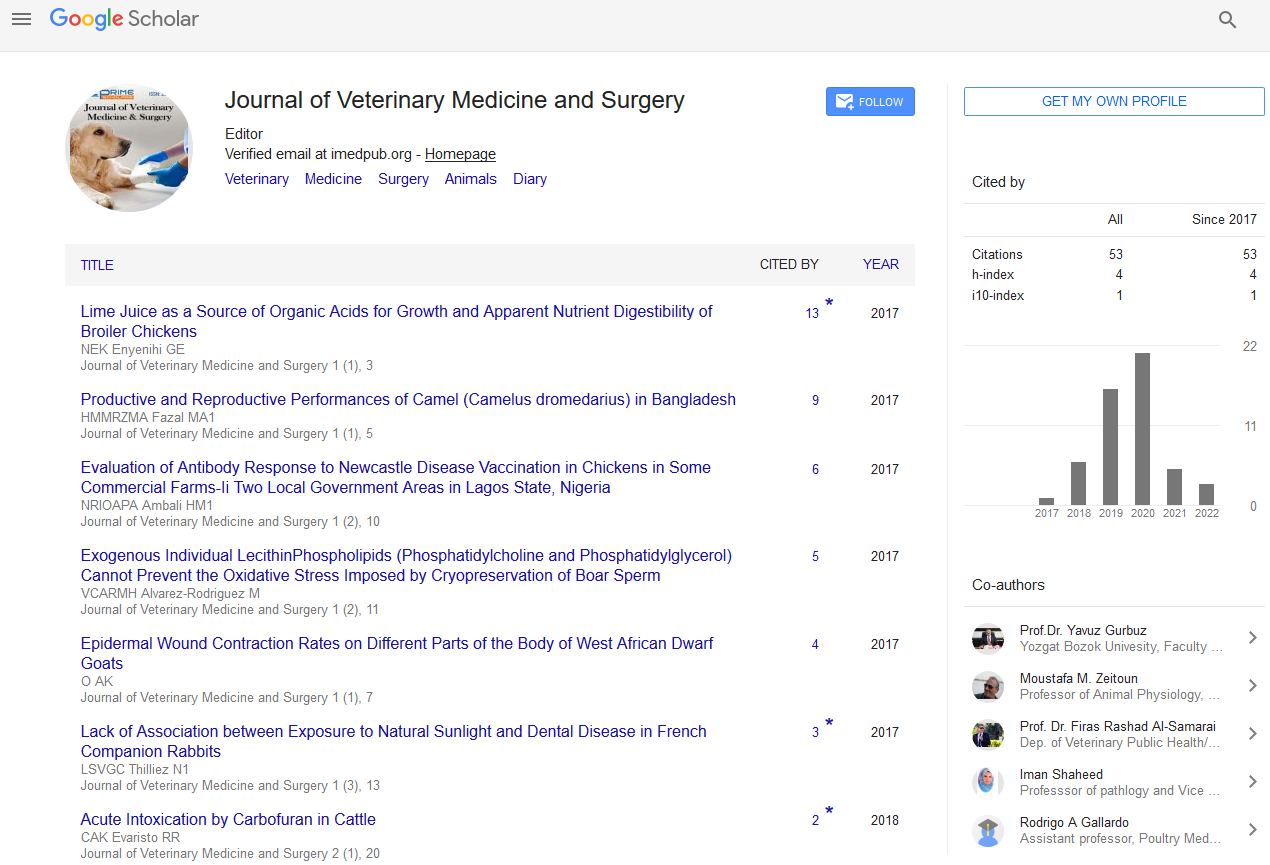Commentary - (2023) Volume 7, Issue 2
Hepatitis Virus in Dogs: Understanding the Threat and Ensuring Canine Health
John Gibraltar*
Department of Veterinary Sciences, University of Minnesota, USA
*Correspondence:
John Gibraltar,
Department of Veterinary Sciences, University of Minnesota,
USA,
Email:
Received: 29-May-2023, Manuscript No. IPJVMS-23-17345;
Editor assigned: 31-May-2023, Pre QC No. IPJVMS-23-17345(PQ);
Reviewed: 14-Jun-2023, QC No. IPJVMS-23-17345;
Revised: 19-Jun-2023, Manuscript No. IPJVMS-23-17345(R);
Published:
26-Jun-2023, DOI: 10.36648/2574-2868.7.2.16
Description
Dogs are beloved companions to millions of people around the
world, providing joy, loyalty, and unconditional love. To ensure
their well-being, it is crucial to be aware of potential health
risks they may face. One such threat is the hepatitis virus, which
can severely impact a dog’s health and longevity. In this article,
we will delve into the world of hepacivirus in dogs, exploring its
causes, symptoms, prevention, and treatment. Canine hepatitis,
caused by the canine adenovirus type 1 (CAV-1), is a highly
contagious viral disease that primarily affects the liver. This virus
belongs to the family Adenoviridae and is commonly found
in dogs all around the world. The virus spreads through contact
with contaminated feces, urine, saliva, or any objects that have
been exposed to the virus. The symptoms of hepatitis virus in
dogs can vary widely, ranging from mild to severe. Common
signs of infection include lethargy, loss of appetite, vomiting,
diarrhea, abdominal pain, and fever. As the disease progresses,
more serious symptoms may develop, such as jaundice (yellowing
of the eyes and skin), excessive thirst, and neurological
issues like seizures. In severe cases, canine hepatitis can lead
to acute liver failure, which can be life-threatening. Puppies
and older dogs are particularly susceptible to severe forms of
the disease due to their weaker immune systems. Prevention is
key when it comes to protecting your furry friend from hepatitis
virus. Vaccination plays a pivotal role in safeguarding dogs
against this potentially deadly virus. The core vaccines that
protect against CAV-1 are often included in the routine vaccination
schedule for puppies. These vaccines not only provide
immunity against hepatitis but also guard against other infections
such as canine distemper and parvovirus. It’s essential to
follow your veterinarian’s recommended vaccination schedule
and keep up with booster shots to ensure your dog’s continued
protection. Additionally, practicing good hygiene and avoiding
contact with sick dogs can help reduce the risk of exposure to
the virus. If you suspect your dog might be infected with the
hepatitis virus, it’s crucial to consult a veterinarian promptly.
The vet will perform a thorough physical examination and may
recommend blood tests to diagnose the infection. In some
cases, imaging techniques like ultrasound or X-rays might be
employed to assess the extent of liver damage. Treatment for
canine hepatitis varies depending on the severity of the infection.
Supportive care is often the mainstay of treatment, which
includes providing fluids, electrolytes, and medications to alleviate
symptoms. In severe cases, hospitalization may be necessary
to monitor and stabilize the dog’s condition. Antibiotics
might be prescribed to prevent secondary bacterial infections.
Recovery from canine hepatitis can be a lengthy process. Dogs
that have survived the acute phase of the illness may continue
to experience liver damage. Regular veterinary check-ups,
along with a tailored diet and appropriate medications, are vital
to aid the liver’s healing process and manage any ongoing
health issues. Canine hepatitis caused by the hepatitis virus is
a serious health concern that can impact a dog’s quality of life
and even prove fatal if left untreated.
Acknowledgement
None.
Conflict Of Interest
None.
Citation: Gibraltar J (2023) Hepatitis Virus in Dogs: Understanding the Threat and Ensuring Canine Health. J Veterinary Med. 7:16.
Copyright: © 2023 Gibraltar J. This is an open-access article distributed under the terms of the Creative Commons Attribution License, which permits unrestricted use, distribution, and reproduction in any medium, provided the original author and source are credited.

